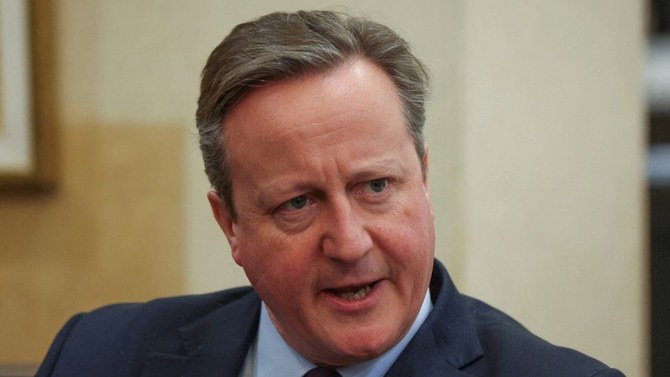WASHINGTON/DETROIT: US President Donald Trump signed a pair of orders to soften the blow of his auto tariffs on Tuesday with a mix of credits and relief from other levies on materials, and his trade team touted its first deal with a foreign trading partner.
The developments helped eased some investor worries about the erratic trade policies of Trump as the president visited Michigan, a cradle of the US auto industry, just days before a fresh set of 25 percent import taxes was set to kick in on automotive components.
The trip, on the eve of his 100th day in office, came as Americans take an increasingly dim view of Trump’s economic stewardship, with indications his tariffs will weigh on growth and could drive up inflation and unemployment.
In his latest partial reversal of tariff policies, the Republican president agreed to give carmakers two years to boost the percentage of domestic components in vehicles assembled domestically.
It will allow them to offset tariffs for imported auto parts used in US-assembled vehicles equal to 3.75 percent of the total value of the Manufacturer’s Suggested Retail Price of vehicles they build in the US through April 2026, and 2.5 percent of US production through April 30, 2027.
Auto industry leaders had lobbied the administration furiously during the weeks since Trump first unveiled his 25 percent tariffs on imported vehicles and auto parts. The levies, aimed at forcing automakers to reshore manufacturing domestically, had threatened to scramble a North American automotive production network integrated across the US, Canada and Mexico.
It offers the industry a “little relief” as companies invest in more US production, Trump said as he left Washington for Michigan. “We just wanted to help them ... if they can’t get parts, we didn’t want to penalize them.”
The White House said the change will not affect the 25 percent tariffs imposed last month on the 8 million vehicles the United States imports annually.
Autos Drive America, a group representing Toyota Motor, Volkswagen, Hyundai and nine other foreign automakers, said Trump’s order provided some relief “but more must be done in order to turbocharge the US auto industry.”
MORE TARIFF UNCERTAINTY
Candace Laing, president of the Canadian Chamber of Commerce, said the tariff fix fell short of what companies in the deeply integrated North American industry needed.
“Only an end to tariffs provides real relief. Ongoing ups and downs perpetuate uncertainty, and uncertainty drives away business for both Canada and the U.S,” she said in a statement.
The uncertainty unleashed across the auto sector by Trump’s tariffs remained on full display Tuesday when GM pulled its annual forecast even as it reported strong quarterly sales and profit. In an unusual move, the carmaker also opted to delay a scheduled conference call with analysts until later in the week, after the details of tariff changes were known.
Meanwhile, US Commerce Secretary Howard Lutnick told CNBC he had reached a deal with one foreign power that should permanently ease the “reciprocal” tariffs Trump plans to impose. Lutnick declined to identify the country, saying the deal was pending local approvals.
“I have a deal done ... but I need to wait for their prime minister and their parliament to give its approval,” he said.
White House officials had no further comment on the country in question, but Trump struck an upbeat tone about a deal with India, telling reporters: “India is coming along great. I think we’ll have a deal with India.”
Lutnick’s comments helped further lift stock prices that had been battered by Trump’s moves to reshape global trade and force goods makers to shift production to the US. The benchmark S&P 500 Index closed 0.6 percent higher for a sixth day of gains, its longest streak of gains since November.
WRONG ON EVERY PREDICTION
Trump and his team aim to strike 90 trade deals during a 90-day pause on his reciprocal tariffs announced earlier in April. His administration has repeatedly said it was negotiating bilateral trade deals with dozens of countries.
A chief Trump goal is to bring down a massive US goods trade deficit, which shot to a record in March on a surge of imports aimed at front-running the levies.
Trump’s aggressive trade stance has cascaded through the global economy since his return to office in January, and the 90-day pause was unveiled after fears of recession and inflation sent financial markets into a tailspin.
Easing the impact of auto levies is Trump’s latest move to show flexibility on tariffs which have sown turmoil in financial markets, created uncertainty for businesses and sparked fears of a sharp economic slowdown. A Reuters/Ipsos poll published Tuesday showed just 36 percent of respondents approve of his economic stewardship, the lowest level in his current term or in his 2017-2021 presidency.
Meanwhile, the US will release the first quarterly report on US gross domestic product during Trump’s term on Wednesday. It is expected to reflect a large drag from his tariffs, mostly from a record surge in imports as companies and consumers front-loaded purchases of foreign goods to try to beat the new levies. The economy is expected to have expanded at a 0.3 percent annualized rate from January through March, according to a Reuters poll of economists, down from 2.4 percent in the final three months of 2024.
American and global companies are increasingly sounding the alarm about the tariffs’ effects on their ability to plan.
UPS on Tuesday said it would cut 20,000 jobs to lower costs, while US ketchup maker Kraft Heinz and Swedish appliances maker Electrolux were among companies citing tariff headwinds.
About 40 companies worldwide have pulled or lowered their forward guidance in the first two weeks of first-quarter earnings season, a Reuters analysis showed.
“Every single prediction has been proved to be wrong,” Yannick Fierling, Electrolux CEO, told Reuters. “I’m surprised if people are claiming they have a view where tariffs are going.”



























